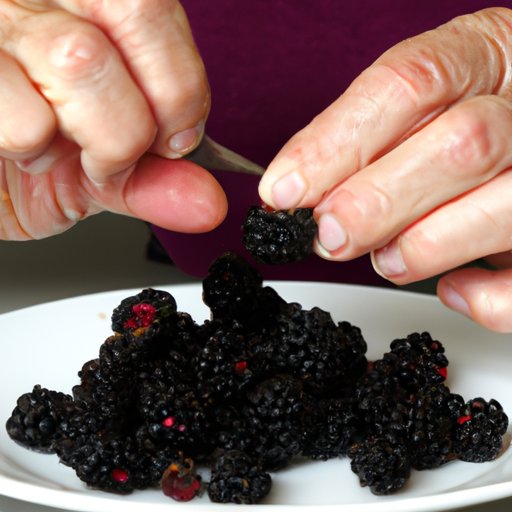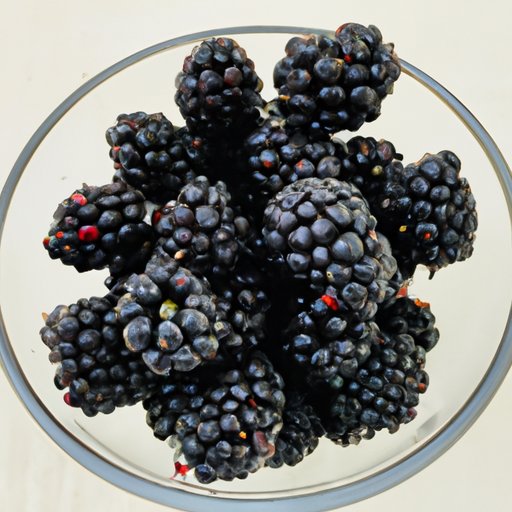Introduction
Blackberries are a small, sweet, and tart fruit that is packed with nutrients. They can be eaten fresh or added to various dishes for an extra boost of flavor and nutrition. In this article, we’ll explore the health benefits of blackberries, their nutritional profile, and how to incorporate them into your diet. We’ll also discuss potential risks associated with consuming too many blackberries and compare them to other fruits.
Health Benefits of Blackberries
Blackberries are a nutrient-dense food that provide numerous health benefits. Some of the most notable include:
Antioxidants
Blackberries are an excellent source of antioxidants. Antioxidants help protect your body from damage caused by free radicals, which can lead to chronic diseases such as cancer and heart disease. According to a study published in the journal Food Chemistry, blackberries contain high levels of phenolic compounds, which are powerful antioxidants that can help reduce inflammation and protect against oxidative stress.
Fiber
Blackberries are a good source of dietary fiber. Fiber helps keep your digestive system healthy and can help promote weight loss by making you feel fuller for longer. One cup of blackberries contains 8 grams of fiber, which is 32% of the recommended daily value.
Vitamins and Minerals
Blackberries are rich in essential vitamins and minerals, including vitamin C, potassium, magnesium, and iron. Vitamin C helps boost your immune system, while potassium helps lower blood pressure and magnesium helps regulate metabolism. Iron is important for healthy red blood cell production.
Nutritional Profile of Blackberries
In addition to the aforementioned health benefits, blackberries also offer a variety of nutritional benefits. Here is a breakdown of their nutritional profile per one cup (144 grams):
Calories
One cup of blackberries contains 62 calories.
Protein
Blackberries contain 2 grams of protein per cup.
Fat
Blackberries contain 0.7 grams of fat per cup.
Carbohydrates
Blackberries contain 14.7 grams of carbohydrates per cup.
Sugar
Blackberries contain 7.4 grams of sugar per cup.

How to Incorporate Blackberries into Your Diet
Blackberries are incredibly versatile and can be incorporated into a variety of dishes and snacks. Here are some ideas for incorporating blackberries into your diet:
Salads
Add blackberries to salads for a delicious, sweet, and tart flavor. They pair especially well with spinach, feta cheese, and nuts.
Yogurt
Top plain yogurt with blackberries for a quick and nutritious snack.
Smoothies
Blend blackberries with other fruits and vegetables for a nutrient-packed smoothie.
Desserts
Add blackberries to cakes, pies, and other desserts for a pop of flavor and color.
Sauces
Make a blackberry sauce to drizzle over pancakes, waffles, or ice cream.

Potential Health Risks of Eating Too Many Blackberries
Although blackberries offer numerous health benefits, they should be consumed in moderation. Eating too many blackberries can have negative side effects, including:
Allergies
Some people may be allergic to blackberries and experience symptoms such as itching, swelling, hives, and difficulty breathing. If you experience any of these symptoms after eating blackberries, seek medical attention immediately.
Excessive Sugar Consumption
Blackberries contain natural sugars, so it’s important to watch your intake if you’re trying to limit your sugar consumption. Eating too much sugar can lead to weight gain, increased risk of diabetes, and cavities.
Comparison of Blackberries vs Other Fruits
When comparing blackberries to other fruits, it’s important to consider their nutritional value and health benefits. Here is a comparison of blackberries versus other popular fruits:
Nutritional Value
Blackberries are a nutrient-dense food that provides more vitamins and minerals than other fruits. For example, one cup of blackberries contains more vitamin C than oranges and more potassium than bananas.
Health Benefits
Blackberries offer numerous health benefits due to their high antioxidant content. Studies have shown that they can help reduce inflammation, improve brain function, and protect against oxidative stress. Additionally, blackberries are a good source of fiber, which can help promote weight loss.
Recipes Using Blackberries
Blackberries can be used in a variety of recipes for breakfast, lunch, dinner, and dessert. Here are some ideas for recipes using blackberries:
Blackberry Cobbler
This classic dessert is easy to make and sure to please. All you need is blackberries, sugar, flour, butter, and cinnamon.
Blackberry Jam
Make your own blackberry jam with just a few simple ingredients. Spread it on toast, add it to oatmeal, or use it as a topping for ice cream.
Blackberry Smoothie
Blend blackberries with almond milk, banana, and your favorite protein powder for a nutritious and delicious smoothie.
Baked Oatmeal with Blackberries
This tasty breakfast dish is perfect for busy mornings. It’s easy to make and full of healthy ingredients, such as oats, almonds, coconut oil, and blackberries.
Conclusion
Blackberries are a nutrient-dense fruit that offer numerous health benefits. They are an excellent source of antioxidants, fiber, and vitamins and minerals. They are also low in calories and fat and contain natural sugars. Blackberries can be eaten fresh or added to a variety of dishes for an extra boost of flavor and nutrition. However, it is important to consume them in moderation, as eating too many can lead to health risks such as allergies and excessive sugar consumption.
Overall, blackberries are a healthy and delicious addition to any diet. Whether you enjoy them fresh, frozen, or cooked, they are sure to add a delightful sweetness to your meals.
(Note: Is this article not meeting your expectations? Do you have knowledge or insights to share? Unlock new opportunities and expand your reach by joining our authors team. Click Registration to join us and share your expertise with our readers.)
